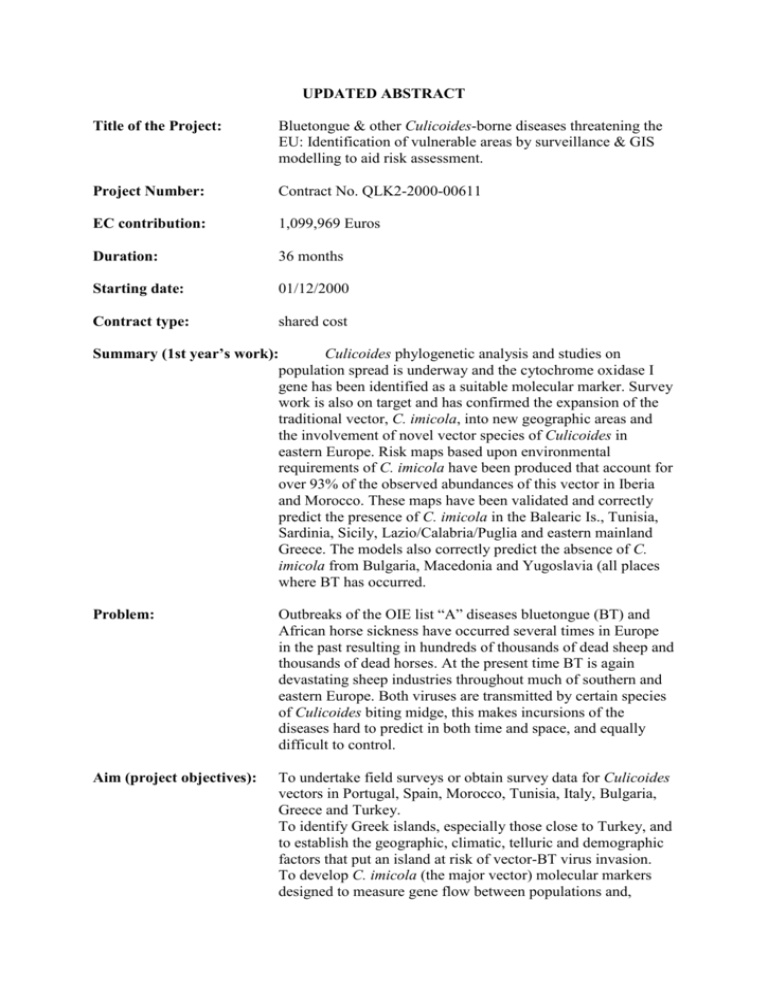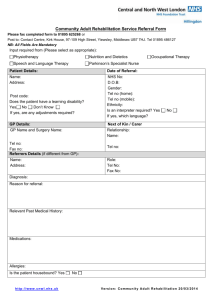Link to updated Abstract
advertisement

UPDATED ABSTRACT Title of the Project: Bluetongue & other Culicoides-borne diseases threatening the EU: Identification of vulnerable areas by surveillance & GIS modelling to aid risk assessment. Project Number: Contract No. QLK2-2000-00611 EC contribution: 1,099,969 Euros Duration: 36 months Starting date: 01/12/2000 Contract type: shared cost Summary (1st year’s work): Culicoides phylogenetic analysis and studies on population spread is underway and the cytochrome oxidase I gene has been identified as a suitable molecular marker. Survey work is also on target and has confirmed the expansion of the traditional vector, C. imicola, into new geographic areas and the involvement of novel vector species of Culicoides in eastern Europe. Risk maps based upon environmental requirements of C. imicola have been produced that account for over 93% of the observed abundances of this vector in Iberia and Morocco. These maps have been validated and correctly predict the presence of C. imicola in the Balearic Is., Tunisia, Sardinia, Sicily, Lazio/Calabria/Puglia and eastern mainland Greece. The models also correctly predict the absence of C. imicola from Bulgaria, Macedonia and Yugoslavia (all places where BT has occurred. Problem: Outbreaks of the OIE list “A” diseases bluetongue (BT) and African horse sickness have occurred several times in Europe in the past resulting in hundreds of thousands of dead sheep and thousands of dead horses. At the present time BT is again devastating sheep industries throughout much of southern and eastern Europe. Both viruses are transmitted by certain species of Culicoides biting midge, this makes incursions of the diseases hard to predict in both time and space, and equally difficult to control. Aim (project objectives): To undertake field surveys or obtain survey data for Culicoides vectors in Portugal, Spain, Morocco, Tunisia, Italy, Bulgaria, Greece and Turkey. To identify Greek islands, especially those close to Turkey, and to establish the geographic, climatic, telluric and demographic factors that put an island at risk of vector-BT virus invasion. To develop C. imicola (the major vector) molecular markers designed to measure gene flow between populations and, thereby, to measure rates of vector population expansion and sources of incursion. To assess whether the distributions of vector Culicoides are expanding, by resurveying areas found previously to be vectorfree but situated close to areas or islands that have vector populations. To identify climatic factors favouring large increases in vector population size in certain years, and thereby, significantly increase the risk of epizootics. To identify novel vector species of Culicoides and assess their levels of vector competence and distributions. To attempt isolation of BT virus from Culicoides vectors during an outbreak in south-eastern Europe. Expected results: To reduce or eliminate from the EU and adjoining territories risk of incursion or establishment of internationally important Culicoides-borne viral diseases by: identification of the vectors, virus isolation, estimation of vector population distribution and spread, and production of predictive (disease-risk) maps for Europe and surrounding areas. Potential applications: The results will enable disease incursions to be predicted in time and space and areas “at risk” to be demarcated. This will enable targeted, cost effective control measures to be implemented without delay. The results will be of value to veterinary authorities, international disease control agencies, import-export authorities, legislators and farmers. Key words: Culicoides-borne diseases, vector identification, bluetongue, predictive modelling, risk maps, molecular markers, population changes, risk assessment, satellite imagery, GIS. Partners: Co-ordinator – Partner 1 Dr PS Mellor & Dr M Baylis, Institute for Animal Health, Pirbright Laboratory, Ash Rd., Pirbright, Woking, Surrey, GU24 0NF, UK Tel: +44 1483 232441 Fax: +44 1483 232448 e-mail: philip.mellor@bbsrc.ac.uk matthew.baylis@bbsrc.ac.uk Partner 3 Prof D Rogers, TALA Group, Department of Zoology, Partner 2 Dr AJ Mordue & Dr JF Dallas, Department of Zoology, The University of Aberdeen, Tillydrone Avenue, Aberdeen AB24 2TZ, Scoland, UK Tel: +44 1224 272121 Fax: +44 1224 272319 e-mail: a.j.mordue@abdn.ac.uk j.dallas@abdn.ac.uk Partner 4 Dr D Panagiotatos, Ministry of Agriculture, DG of Veterinary Services, Oxford University, South Parks Rd., Oxford, OX1 3PS, UK Tel: +44 1865 271234 Fax: +44 1865 310447 e-mail: david.rogers@zoology.oxford.ac.uk 2, Acharnon St., 10176 Athens, Greece Tel: +30 1883 5420 Fax: +30 1822 9188 e-mail: vetserv@ath.forthnet.gr Partner 5 Profs N Nedelchev & G Georgiev, Central Veterinary Research Institute, P. Slaveikov Blvd., No. 15, 1606 Sofia, Bulgaria Tel: +359 238 3011 Fax: NA e-mail: director@mail.iterra.net Partner 6 Prof R Capela, Rector, Universidade da Madeira, Campus Universitario da Penteada, 9000 Funchal, Madeira, Portugal Tel: +351 291 222417 Fax: +351 291 230209 e-mail: rcapela@uma.pt Partner 7 Dr Y Braverman, Kimron Veterinary Institute, PO Box 12, 50250 Bet Dagan, Israel Tel: +972 396 81682 Fax: +972 396 05293 e-mail: ybrav_vs@netvision.net.il Partner 8 Prof I Burgu. Department of Virology, Faculty of Veterinary Medicine, University of Ankara, Irfan Bastug Cad. Diskapi, 0610 Ankara, Turkey Tel: +90 312 3070315/222 Fax: +90 312 3164472 e-mail: aykut.ozkul@veterinary.ankara.edu.tr Partner 9 Dr A Tber, Ministry of Agriculture, Rural Development & Fisheries, Department of Livestock, Place Chefchaouni, Quartier Administratif, Rabat, Morocco Tel: +212 776 5077 Fax: +212 776 4404 e-mail: demamv@mtds.com Partner 10 Prof V Caporale, IZS “G Caporale”, Via Campo Boario, 64100 Teramo, Italy Tel: +39 861 332279 Fax: +39 861 332251 e-mail: caporale@izs.it Partner 11 Dr S Hammami, Associate General Director, Institut de al Recherche Veterinaire, 1006 Tunis, Tunisia Tel: +216 156 2602 Fax: +216 156 9692 e-mail: hammami.salah@iresa.agrinet.tn Major sub-contractor (to Partner 1) Dr JM Sanchez-Vizcaino, CISA/INIA, 28130 Valdeolmos, Madrid, Spain. Tel: +349 620 2300 Fax: +349 620 2247 e-mail vizcaino@inia.es





